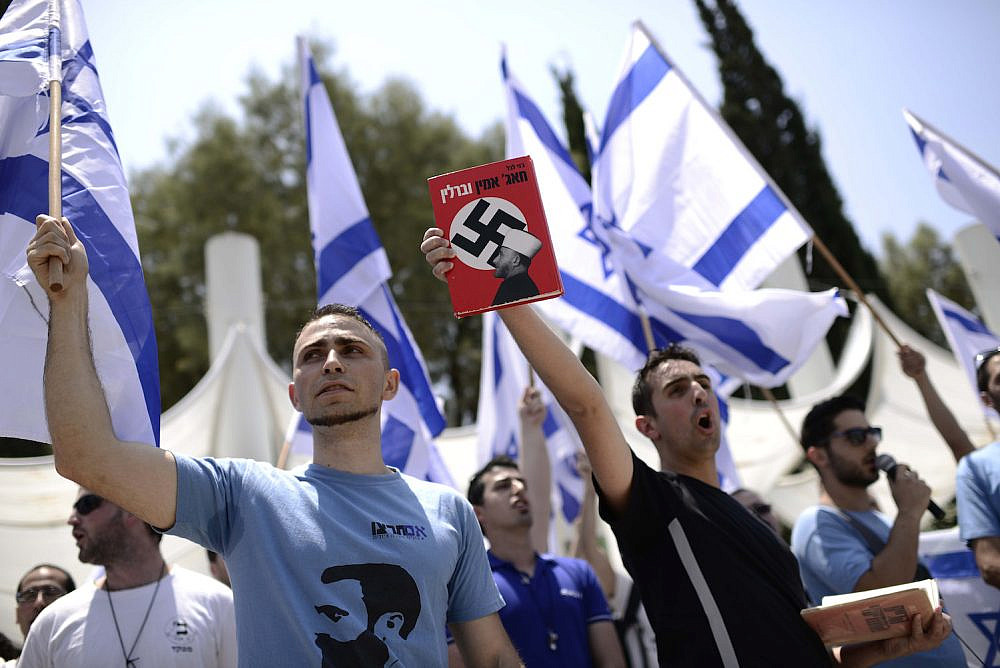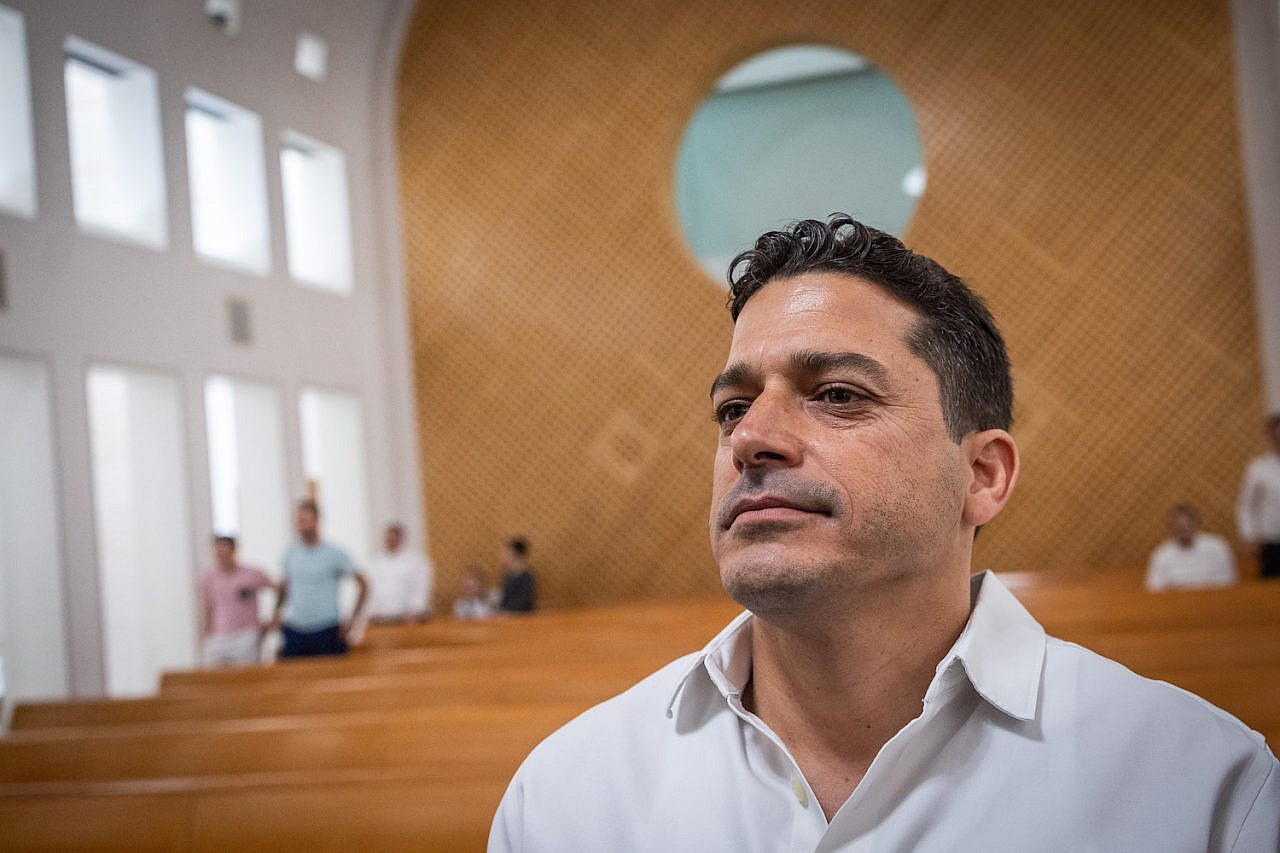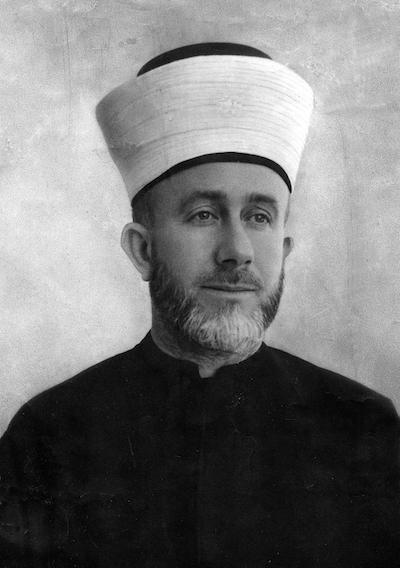This article originally appeared in “The Landline,” +972’s weekly newsletter. Subscribe here.
Yom HaShoah, or Holocaust Remembrance Day, is a solemn occasion in Israel and across the Jewish diaspora. Memorial ceremonies are held, often attended by survivors; testimonies about the horrors of the Nazi regime are disseminated across social media and in the press; and, in Israel, a two-minute air-raid siren blares, bringing much of the country to a halt.
The occasion is also, however, an opportunity for hasbarists to share one of their favorite, and most repugnant, smears: that the Palestinian people are, in fact, Nazis.
The Palestinian-as-national-socialists canard does not only pop up around Holocaust Remembrance Day, though it is probably the most corrupt occasion on which to deploy it. It’s a take that has been elevated to the status of a hasbara trope — one that attempts the moral legwork of preemptively justifying any brutality Israel visits on Palestinians, by implying they essentially brought it upon themselves.
This smear takes on numerous forms. One version is what I’ll call the modernist take, as recently offered by Israel’s far-right Diaspora Minister Amichai Chikli, who called the Palestinian Authority a “neo-Nazi” organization that is the “most antisemitic entity on earth” — comments that sound like nails on a chalkboard to anyone vaguely familiar with the genealogy of neo-Nazism.
A more common form is the revisionist take, popularized by Prime Minister Benjamin Netanyahu several years ago: the insistence that Amin al-Husseini, the Grand Mufti of Jerusalem during the British Mandate and the 1948 war, represented the totality of Palestinian sentiment toward the Nazis during his warm encounters with Adolf Hitler, and that it was he who had given the Führer the idea for the Final Solution. Husseini had indeed professed his support for Hitler; as did some Arab nationalist groups, and even a number of far-right Jews active in Palestine at the time, the Mufti viewed potential Nazi collaboration as a means to achieving his anti-British political goals. And yet, there was no pro-Nazi consensus among Palestinians or the wider Arab world.
The rendering of Palestinians as Nazis has a long history, and such comparisons have been made since the immediate aftermath of World War II, if not before. On Sept. 11, 1945, for example, the right-wing New Zionist Organization of America — a Revisionist outfit then led by Benzion Netanyahu, father of the current Israeli prime minister — took out an advert in the New York Post that referred to Palestinians as “oriental Nazis.”
Not long after, a member of a far-right Zionist youth group in the United States claimed that the Grand Mufti al-Husseini had “recently [been] proved responsible for the plan for the extermination of European Jewry” — the same gross distortion aired by Netanyahu in 2015.
This language was typical of far-right Zionist discourse at the time. With the horrors of the Holocaust still fresh, much of the campaign for a Jewish state rested on invoking such comparisons and presenting any obstacles to statehood as prolonging a proven continuum of annihilation; the British, then in control of Palestine, were thus also accused of Nazism.
Nor was it just the perceived enemies of Zionism who were described in these terms: the Zionist project writ large was portrayed as a choice between statehood and extinction. In a typical example, Nathan Friedman-Yellin (later Yellin-Mor), one of the leaders of the underground Jewish terrorist group Lehi, signed off a letter to the organization’s American supporters with the words: “[W]e are bound to meet as Jews. It is up to us whether we shall meet at the entrance to gas chambers or in a great and free Homeland.”
The Jewish right has applied the “Nazi” label to other perceived threats to Israel over the decades: Egyptian President Gamal Abdel Nasser was deemed a “new Hitler” in the 1950s, for example, and Netanyahu has frequently likened Iran’s Islamic regime to the Nazis. Yet while these parallels are always unhelpful and ahistoric, only in the Palestinian case are they applied to a group that Israel has, over the past 70-plus years, systematically expelled, incarcerated, and segregated.
There are numerous reasons for this persistent likening of the Palestinians to the genocidal fascists responsible for the destruction of European Jewry. The most mundane of these is that it is a practice which began in the 1940s and ’50s and never went away (see also: deeming areas under Israel’s control not yet settled by Jews “Judenrein”). It is also a way of playing on the historical guilt of an international community that did not do enough to stop the Nazis; a similar threat is rising once more, the analogy goes, and this time you cannot say you didn’t know.
But the broadest, most dangerous function of the smear is in the latitude it is intended to grant Israel in its abuses, thus contributing to the larger project of obscuring the root causes of violence in Israel-Palestine. Describing one’s victims using the internationally-recognized shorthand for pure evil makes the ugly business of colonization and occupation not just permissible, but a moral imperative. Under this rubric, forced displacement, mass incarceration, extrajudicial killings, and home demolitions are not war crimes or human rights abuses, but rather necessary tools in a desperate, existential struggle against an irredeemable enemy.
Most read on +972
Moreover, in casting Palestinians as the inheritors of annihilative antisemitism, Netanyahu, Chikli, and the rest of their hasbarist chorus are sowing the seeds of eternal war; true evil, after all, can never be fully destroyed. They are also framing any opposition to that war (e.g. calling for national, human, or civil rights for Palestinians) as an attack on Jews — at best a sign of reckless ignorance, and at worst evidence of inveterate “Jew-hatred.” If you are seeking justice and liberation for Nazis, so the reasoning goes, then there can be no explanation other than that you, too, are an antisemite, whether or not you know it or want to admit to it.
The fact that such comparisons are a desecration of Jewish collective memory evidently matters little to those who employ them, not least when they do so as many of us are taking time to mourn the devastation wrought on our ancestors by the actual Nazis. The rhetorical power in invoking Jewish historical trauma to justify the unjustifiable is too valuable, and that mechanism too entrenched, for Israeli politicians and other members of the Jewish far right to walk away from. The fact that there are fascists stalking the Knesset hallways — some of whom harbor their own eliminationist fantasies — is a further assault on this memory, in spite of their claims that they are acting to defend it.
Ultimately, when the causes and legacies of the Holocaust are distorted — as they consistently are by the Israeli government and the wider Jewish far right — everyone loses. But the prize of a unilateral mandate to oppress and terrorize Palestinians is, apparently, too great to forgo.







